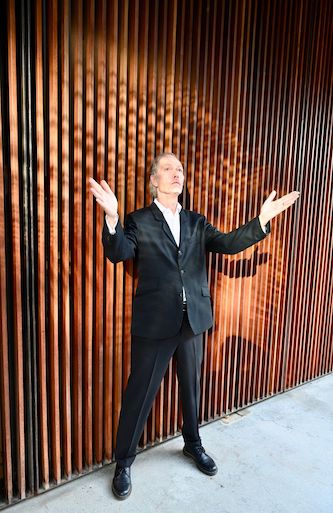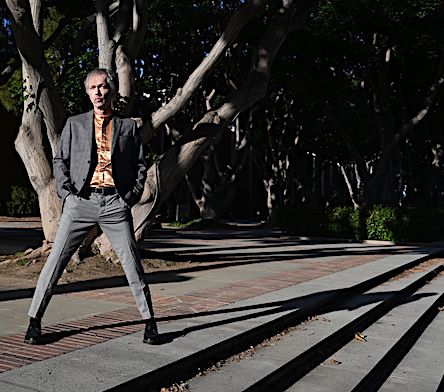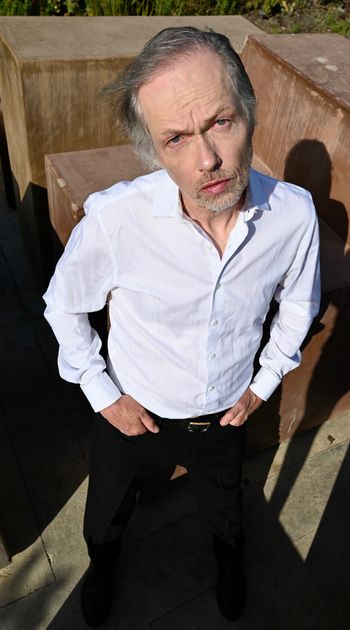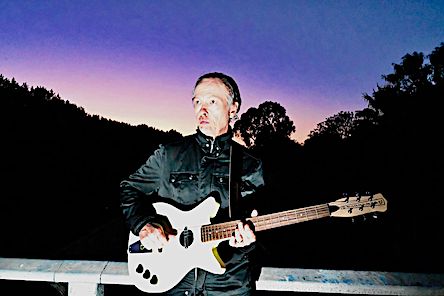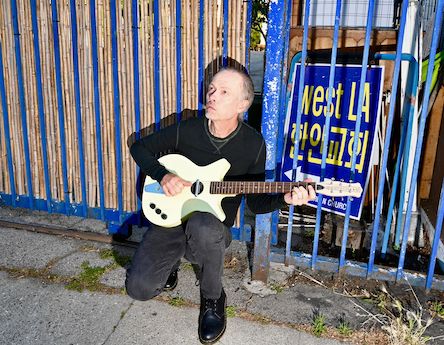 
|
||||
|
|
DENNIS DAVISON |
|||
|
mwe3.com presents a new interview with
Dennis Davison: The album was mixed and mastered before the lockdown. I was just getting ready to manufacture when everything closed down. It put me back a few months, but I wasn’t on a deadline. The lockdown happened a few weeks after I’d started on anti-depressant medication. It was something I should have done many years ago, but always resisted. It’s helped me to focus on tasks that I’d had a hard time with in the past. Combined with having little social life during the pandemic, I’ve been able to concentrate on getting the record out and promoting it. We ended The Jigsaw Seen in 2018. I tend not to revisit much of the music that I’m familiar with. There’s so much new stuff that I think is amazing, like Aldous Harding. Most of the older stuff that I listen to are artists that I missed the first time around, like Faust or bands that I didn’t pay much attention to that I now love, such as Silver Apples. mwe3: Was it a challenge recording the The Book Of Strongman on your own? As this is your first solo album, what was it like recording outside of the Jigsaw Seen? Has the other Jigsaw Seen members listened to it and are you going to also make another album at some point with The Jigsaw Seen? Were these songs new or did you write them at different stages? Dennis Davison: It was a challenge, but it was very freeing. I worked in a way that could never work in a band setting. I jumped from song to song and instrument to instrument, depending on my inspiration at that moment. I had no rules and no input from anyone else until I moved it into Catasonic Studios to record drums and mix. I also re-recorded the acoustic guitars in the studio, because they had a Guild D-55 that I liked. Electric guitars, bass, keyboards and vocals were recorded at home. I started off recording having only three of the ten songs already written, which were “The Spoken Word” and the two songs that bookend the album and guided the theme by referencing my father “Strongman And Sonny James” and “What The Hell Is That Noise?” The other songs were written along the way to tell a story and flesh out the soundscape. mwe3: Do you write lyrics and melodies separately or do they usually come together as one? The album proves that your work as a multi-instrumentalist is brilliant. The Book Of Strongman makes an indelible mark on the collective pop music psyche. Do you feel this is your best recording to date? Dennis Davison: Thank you so much! Sometimes I’ll get a bit of a melody in my head. Other times, maybe a phrase. It seems like usually though I’ll have a little of both. I almost always flesh out the melody and structure before I complete the lyric. Even though I wrote and sang the songs in the Jigsaw Seen, I still look at this album as something different. The Book of Strongman is a very personal album in many ways. I didn’t want it to sound like a singer/songwriter album and I don’t think it does. I’m already about half finished with the next one.
Dennis Davison: Sean did seem to like the album and was complimentary. The mastering was done on-line. I just sent the mixes to Abbey Road and Sean mastered it, sent it back to me and I usually might suggest adjustments, but I think this time it sounded right on the first try. mwe3: Also, I have to credit to your engineer and mixer, Mark Wheaton. Where is Catasonic Studios What part of L.A. is it based in? Dennis Davison: Yes, Mark did a great job! He’s in the Silverlake/Echo Park area. He was the right guy for this album. I wanted to combine a lot of noise elements and primitive sounding electronics to contrast with the melodic song structures. Mark loves that stuff! He introduced me to the Blipblox, which is heard at the beginning of “Auras.” mwe3: Is the lead-off track on your new album “Strongman And Sonny James” based on actual events? Did your father serve in the Korean War with Sonny James? Your father was a big influence in your life, did you call him Strongman before and did he really know Sonny? I was just remembering Sonny recorded his version of the song “Young Love” into such a big hit all the way back in 1957. What other memories about talking to your father about this can you note in that track? Dennis Davison: Yes, my father used his older brother’s birth certificate and joined the army when he was 15 years old. He and Sonny James became good friends in Korea. The album cover illustration references the Korean flag with the yin/yang sun and the 4 symbols. My father was in some historically awful battles over there. When I was a child, I invented a character called Strongman and I would make up stories of our adventures together, most of which started off in the woods. One day, my mother asked me who Strongman was and I told her he was my father. The album combines parts of my history, parts of my father’s history and our mutual history, all filtered through the fictional Strongman. mwe3: Wow, it sounds like a dream. I thought it was a dream. Dennis Davison: Robert, he used his older brother’s birth certificate. When he got back to the states the military found out about it and refused to give him his benefits. My father told them that he was going to take his story to the Baltimore Sun newspaper and they changed their tune and he got his benefits. mwe3: “Shadow On A Tall Tree” has some very Dylan-esque lyrics. Is there a unifying meaning or in the pocket message in the song? The hook is great. It sounds like a folk-rock song played in a psychedelic way, like the Byrds playing Gerry Goffin’s music back in 1968. Dennis Davison: That’s a good description. Each verse is about something different. The “servant to the sundown” verse for instance, is about my father dealing with Alzheimers. The overall meaning of the song is about everything being at the mercy of nature, even the shadows.
Dennis Davison: That’s it. No matter how careless and foolish we are as children, we need to keep some of that with us into adulthood. What could be a bigger folly of youth than joining the army, age 15, and fighting in a war on the other side of the world? I had a Jacques Brel-type of vibe in mind for this. I wrote this and “Can You Imagine?” in the same week. mwe3: “Museum Piece” is very Bee Gees inspired. Did you contrast the beauty in a painting versus real life? Keep your distance is a great line in the song. Someone imagined, like the Mona Lisa or any other, is “stylishly imprisoned”. Yet in fact, we’re the ones imprisoned by a kind of fixation / adulation. Did you write this as a kind of Bee Gees inspired tribute to the late 1960s? Dennis Davison: I really just wanted to write a song about a museum. The song is the personification of a museum piece as a love interest. There are many ways to interpret it. I think of the museum as my memory. Musically speaking, I had been listening to Robin Gibb’s solo album, Robin’s Reign. The songs are lushly orchestrated and melodically soaring, but several of the tracks use a Rhythm Ace drum machine. I wanted to do something like that with this song. I bought an old Rhythm Ace from a guy in Montreal right around the time I started recording the album and used it on this song and two others. I’ve always pictured the song as a music box come to life. mwe3: Tell me about “Can You Imagine?”. Sounds like the plight of man in 2020? Is the song about L.A. and are you still living in L.A.? An ending with no resolution… and all the pollution and all the disrepair… Tragedy is contagious! Dennis Davison: I must have been in a particularly hopeless period when I wrote this. Definitely a negative take on Los Angeles and the music business. I like how this recording turned out. I remember having the drum part going through my head for weeks before I recorded it. I wasn’t sure if I’d actually be able to play it until I got to the studio. It worked! I still live in LA. mwe3: The mellotron plays a factor in a number of these tracks. Tell us about your digital mellotron and the other keyboards on The Book Of Strongman. There were quite a few. Tell us about your favorite 'Tron inspired moments on the album. In the press release, your excellent publicist Robert Vickers mentioned a cross between Robin’s Reign and the first couple Faust albums! Is that his idea or yours? Dennis Davison: It was my idea. That was some of the music that I had been listening to that probably influenced some of the sounds on the album. I was also listening to Silver Apples and Bowie’s Young Americans. I had just bought a Mu-Tron phasor II and it was the best phased guitar sound I’d ever heard, so I wanted to listen to Carlos Alomar’s sounds on that album. I wound up using it on “Museum Piece,” “Heaven Bound,” “Can You Imagine?” and “Auras.” I bought the digital Mellotron when it first came out. I’ve used it on every record since. I used the Chamberlin strings on “Shadow On A Tall Tree” and probably the same sound on “Can You Imagine?” “Museum Piece” is the most Mellotron heavy song on the album. There’s both Chamberlin strings and Celeste on that one. mwe3: What guitars, especially electric guitars, are you playing on the album and how did you get such an excellent drum sound? Dennis Davison: I used two electric guitars on the album, my Fender Mustang and Charvel Surfcaster that I bought in the mid 1990s. Thank you for the compliment, but I am not a drummer. I can come up with simple parts and execute them in the studio, but I couldn’t do it in a live setting. When everything comes together it gives the illusion that I can play! Mark just mic’d up the drums like he always does and that’s how they sounded. We always tweek the EQ in mixing and add reverb.
Dennis Davison: The song is actually about mental illness. It’s inspired by three friends of mine, with a little bit of myself thrown in there too. One friend was in very bad shape and miraculously recovered. He's now doing great. Another tried to commit suicide and she fortunately turned things around and the other is still spiraling downward with little hope of recovering. I was going for something cold and funky with the track. mwe3: Did you make “The Spoken Word” as an Olde English folk ballad into a kind of Strawbs-like protest-prog sound? What keys are you playing on that track? It sounds like a trumpet and it has a kind of dark Spanish aura too probably because of the guitar sound. What guitars are you playing there? Dennis Davison: I wasn't thinking specifically Strawbs, but your description is kind of what I was going for. The song itself has no chorus or change. It’s just verse after verse. My idea was to keep adding instruments and build up the drama until the song ends. I don’t know where the idea for the lyric came from. It seems like an Orwellian take on spoken versus written communication. I used the Guild D-55 acoustic guitar. I think I used the Mustang to play the fuzz riff. The keyboard sounds are Chamberlin trumpet, Chamberlain choir and Tivia organ. mwe3: You decided to use electronic percussion on “Auras”? Is that the final version or can you see adding much more say in a full band? It’s crying out for strings. Inspired by the fires of the past few years? It’s harrowing! That mellotron reprise “auras, auras” is downright harrowing... Dennis Davison: That’s the Rhythm Ace drum machine making another appearance. I wanted something primitive and amateurish sounding. The drum in the intro is a frame drum. It returns toward the end of the song. There are a lot of different synths on this. The main one is a Minimoog. No Mellotron. The “Auras” vocal reprise transitions from my natural voice to vocoder. The lyric describes migraine with auras. I’ve had those since my mid-30s. Along with the pounding headache, your vision becomes like a kaleidoscope with lightning bolts. It’s a battle going on inside your head. The album opens with the battle described in “Strongman And Sonny James” and leads to the internal battle of “Auras.” mwe3: Tell us something about “Aberdeen Vista” and “What The Hell Is That Noise”, which date back a long time to your growing up back and you bring your father into it again. I forgot what state you grew up in and what city was Aberdeen Vista in? How would you contrast where you grew up to living in Los Angeles for so many years?
The area of L.A. where we live now is called Mar Vista. It’s a combo of the two. “What The Hell Is That Noise?” covers the same territory, but in a very different way. Less sentimental, more cryptic and musically dissonant. It focuses specifically on the basement of my parents’ house. All of my bands that rehearsed there are mentioned and near the end of the song there’s a line about my father’s funeral. “Take my nails and sleep in the soil, rest and never weep. Everyone’s in deep.” When I was a little kid, I was afraid to have my finger nails clipped. My mother used to trick me by telling me that we could clip my nails and wrap them in a napkin and give them to my father when he comes home. He would always act very surprised and happy to receive such an amazing gift! When he died, I slipped a folded napkin of my nails into his coffin. mwe3:“What The Hell Is That Noise?” is a sublime way to end the album. What kind of keyboards and guitar affects did you apply to the song? I read you used some of the original sound effects that you recorded with your friend Kevin Mackenzie back in 1980? Any other things you can add about “What The Hell Is That Noise?” Dennis Davison: I always knew that “What The Hell Is That Noise?” had to be the album closer. The only keyboards on the song are mellotron clavinet, which plays a low register single note on the chord changes and piano, which plays on the choruses and during the instrumental section. For the guitars on the verses, I played through a Minifooger MF Ring. It gives the guitar a bell-like quality. The chorus guitars are going through the tremolo on my Fender amp and there’s a riff guitar that leads into the chorus going through my Vox tube drive. The Rhythm Ace gives it a dirgy, Velvet Underground quality that I was looking for. The star of the song though is the white noise feedback created by my friend Kevin MacKenzie. It’s from a home cassette recording that we made in 1980. We were an experimental noise duo called Bizarre Trolls. Kevin invented this instrument by placing a calculator on top of an AM radio. It created this cacophonous feedback that could be slightly altered by tapping the buttons on the calculator. The song got its title from my father coming home from work while we were recording the song and yelling down the stairs, “what the hell is that noise?” All these years later I decided to write a conventional song around the noise. We flew in the sound from our old cassette onto the intro, middle and outro.
Dennis Davison: I’m content right now with what I’m doing. I’m not in a hurry to get back to normal. That could take way longer than people think. I’m not a very nostalgic person. I’m working steadily on a new album. I don’t want to get bogged down in the past. Bring on the new music! Photos courtesy of Michelle Krupkin
Be seen not heard
|
|
|||
|
||||

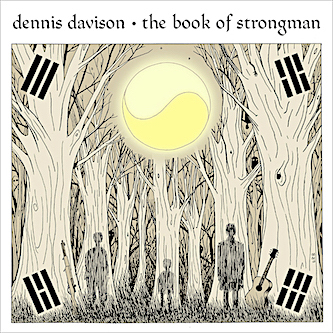 Stepping away from his role as lead singer and songwriter of L.A. pop-rock legends The Jigsaw Seen, singer-songwriter Dennis Davison is making waves with his 2020 debut solo album called The Book Of Strongman. Released on the Pretty Plague label, the album is filled with all the power-pop meets rock magic that marked the best of the Jigsaw Seen records. Speaking about the Jigsaw Seen hiatus, Dennis tells mwe3.com, "We ended The Jigsaw Seen in 2018. I tend not to revisit much of the music that I’m familiar with. There’s so much new stuff that I think is amazing, like Aldous Harding. Most of the older stuff that I listen to are artists that I missed the first time around, like Faust or bands that I didn’t pay much attention to that I now love, such as Silver Apples." Sometimes referred to as one of the finest American rock bands of the 21st century, the Jigsaw Seen legacy is carried further onwards with this very strong solo album from Dennis Davison. Pop-prodigy status aside, it’s worth noting that Dennis not only wrote and sang lead vocals on the album but he plays every instrument on the recording as well. Mastering by Abbey Road studios sound engineer Sean Magee adds the icing on the cake to the sonic finesse on hand here. In the spirit of past masterpieces by The Jigsaw Seen, the CD pressing of The Book Of Strongman is superbly packaged with all the song lyrics. Jigsaw Seen fans and anyone with a keen interest in 21st century pop-rock should not miss Dennis Davison’s 2020 solo debut, The Book Of Strongman.
Stepping away from his role as lead singer and songwriter of L.A. pop-rock legends The Jigsaw Seen, singer-songwriter Dennis Davison is making waves with his 2020 debut solo album called The Book Of Strongman. Released on the Pretty Plague label, the album is filled with all the power-pop meets rock magic that marked the best of the Jigsaw Seen records. Speaking about the Jigsaw Seen hiatus, Dennis tells mwe3.com, "We ended The Jigsaw Seen in 2018. I tend not to revisit much of the music that I’m familiar with. There’s so much new stuff that I think is amazing, like Aldous Harding. Most of the older stuff that I listen to are artists that I missed the first time around, like Faust or bands that I didn’t pay much attention to that I now love, such as Silver Apples." Sometimes referred to as one of the finest American rock bands of the 21st century, the Jigsaw Seen legacy is carried further onwards with this very strong solo album from Dennis Davison. Pop-prodigy status aside, it’s worth noting that Dennis not only wrote and sang lead vocals on the album but he plays every instrument on the recording as well. Mastering by Abbey Road studios sound engineer Sean Magee adds the icing on the cake to the sonic finesse on hand here. In the spirit of past masterpieces by The Jigsaw Seen, the CD pressing of The Book Of Strongman is superbly packaged with all the song lyrics. Jigsaw Seen fans and anyone with a keen interest in 21st century pop-rock should not miss Dennis Davison’s 2020 solo debut, The Book Of Strongman. 